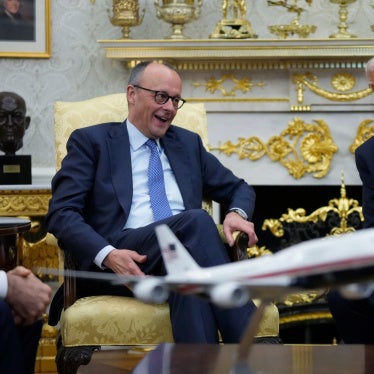(New York) - Uzbek authorities should ensure that an appeal hearing that began today for a human rights advocate is fair and independent, Human Rights Watch said. The activist, Farkhad Mukhtarov, was convicted of criminal charges in a trial that appeared to have been politically motivated, and he was denied the right to defend himself fully, Human Rights Watch said.
Mukhtarov is a long-term member of the Human Rights Alliance of Uzbekistan. He was convicted of fraud and bribery on October 2, 2009 by the Yunusabad District Criminal Court and sentenced to five years in prison. During the trial, and again today at the appeals hearing, plaintiffs withdrew their claims against Mukhtarov, effectively removing the basis for the criminal conviction.
"There is a well documented practice of the government of Uzbekistan, using trumped-up criminal charges against human rights defenders, and Mukhtarov's conviction fits that pattern," said Holly Cartner, Europe and Central Asia director at Human Rights Watch. "He should never have been put on trial in a criminal court in the first place."
Mukhtarov was arrested on July 17, 2009, on the basis of complaints made by Shoira Sadykbekova, M. Karimova, A. Eshanov, and V. Bikbulatova. Sadykbekova accused Mukhtarov of misappropriating 5 million som (roughly US $3320) she had allegedly given him to represent her interests in civil proceedings in 2006, saying he had used this money to bribe the judge. The other plaintiffs accused him of misappropriating large sums of money allegedly given to him as deposits to buy apartments from him. He was charged with fraud (under article 168-3 of the Uzbek Criminal Code) and bribery (under article 28-211-2) by the Yunusabad District prosecutor's office.
Mukhtarov says he is innocent and his human rights colleagues consider the allegations politically motivated in retaliation for his human rights activities.
Members of the Human Rights Alliance who attended the trial, which began on September 7, 2009, told Human Rights Watch that Mukhtarov did not get a fair hearing and that the trial was riddled with procedural violations. They said he was ill-treated while in custody, although he reportedly did not say so during the trial.
They said that the judge, R. R. Bakieva, regularly interrupted Mukhtarov and his lawyers and on at least on one occasion, threatened to expel him from the courtroom and continue the trial without him after he whispered to his lawyer.
Judge Bakieva reportedly refused petitions from Mukhtarov's lawyers, including a request to present defense witnesses. Two of them reportedly intended to testify that their signatures had been falsified on a statement Sadykbekova had given to the court. The judge also refused to admit into evidence an audio recording in which Sadykbekova reportedly was unable to answer questions posed by Mukhtarov about when she had given him money and how much. The judge also reportedly refused to give Mukhtarov's lawyers time to prepare for the closing statement.
The observers said the prosecutor attended only two of the trial's numerous sessions and that some sessions took place without an Uzbek-Russian interpreter, though one of Mukhtarov's lawyers does not speak Uzbek.
Moreover, on September 25, Bikbulatova testified in court that she had no claims against him. In response, Judge Bakieva reportedly asked Bikbulatova three times whether she was sure and then suggested she might want to sue Mukhtarov for moral damages. Bikbulatova refused.
On September 30, two of the other plaintiffs, Karimova and Eshanov, wrote statements in which they said they have no claims against Mukhtarov. On October 2, when they were to submit these statements to the court, Eshanov decided not to, but then changed his mind. Judge Bakieva refused to accept his statement.
Eshkanov submitted his statement at the hearing today at the Tashkent City Criminal Court. Court documents and information shared with Human Rights Watch by Alliance members who attended the trial show that Sadykbekov presented no evidence to substantiate her claims, nor did any of the prosecution's witnesses provide corroboration. At most, under Uzbek law, Sadykbekova's allegations should have given rise to civil, not criminal, charges.
On October 2, Mukhtarov's wife, Surayo, took the amount of money Mukhtarov was accused of owing Sadykbekova to the sentencing hearing to give her as a goodwill gesture, but the judge confiscated the money.
The appeals court today called a recess to consider both Eshanov's statement and a complaint from Sadykbekova over confiscation of the money. The appeals hearing is scheduled to continue on December 3.







